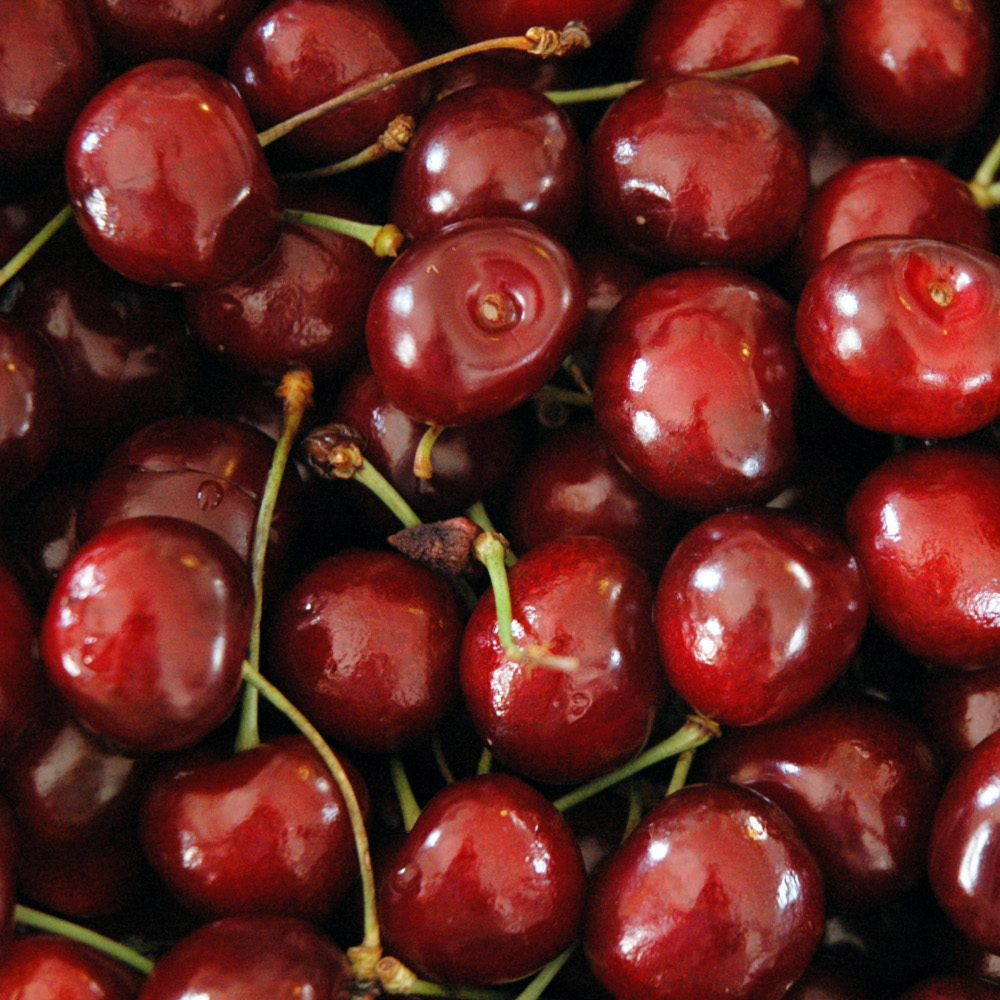
Cherries are often more challenging than other tree fruits to grow, but the reward of picking them from the tree in your yard makes it worth the effort required to do it.
We offer cherry trees on semi-dwarf rootstocks which will produce a 12′-15′ tree if you don’t keep them pruned to a manageable and net-able 8-10ft. height. If you have a tall cherry tree loaded with fruit, you will feed most of it to the birds, since it’s nearly impossible to put netting on a tree that’s tall. Although cherry trees are available on dwarf rootstocks, they produce trees that are very high maintenance and I don’t believe the average person is looking for that much of a challenge. Tart cherries are smaller growing trees, reaching around 12′ tall.
We do not offer the variety Bing. Even though the tree will grow in Michigan, the cherries crack with the slightest rainfall, and the fruit quickly rots. Most dark sweet cherries are sold as Bings.
The varieties of cherries offered are proven to perform well under Michigan growing conditions. They have good tolerance to rain induced cracking, and these varieties are also cold hardy.
Some of these varieties are self fertile which means you only need one tree to produce fruit, others require two different varieties for proper pollination or they will not set fruit. They are all listed as self fertile or pollinator required. Sweet cherries can only pollinate other sweet cherries. Tart cherries are self fertile and can not pollinate sweet varieties.
Space sweet cherry trees 18 – 20 feet apart, and tart cherries 12 – 15 feet apart.
ALL CHERRY TREES ARE PRICED AT $33.00 ea.
.
SWEET CHERRIES
Benton – is a great, newer variety that produces very large, dark cherries with intense flavor and firm flesh. The fruit has nice long stems which make picking much easier, and has good rain induced crack resistance. This variety is becoming one of the most planted commercial varieties in Michigan for all these great attributes and their exceptional flavor. Benton is also self fertile, and a good pollinator for other sweet cherry varieties. Trees are on a semi dwarf rootstock that requires well drained ground, preferably with some slope to it. Ripens mid July.
Self fertile, requires no pollinator
.
Black Pearl – is a great, newer, black sweet cherry that ripens early in the season, Fruit is medium in size with excellent flavor, firmness, and crack resistance. Trees are winter hardy, strong growing and have above average disease resistance. This recent release from the fruit breeding programs at Cornell University is proving to be an excellent eastern sweet cherry that is being widely planted in commercial orchards in Michigan. Fruit ripens in mid-late June. On semi-dwarf rootstock requiring well drained soil.
Requires another sweet cherry variety for pollination
.
Hedelfingen – this heirloom European cherry has performed very well in Michigan for decades, and is still grown by commercial orchards here. Fruit is dark red with firm, sweet flesh and has good crack resistance. Trees are strong growing, cold hardy, and begin bearing at a young age. Hedelfingen requires a pollinator, and any other sweet variety we offer will work. Semi-dwarf rootstock requires well drained soil. Ripens in mid-late July.
Requires a pollinator
.
Kristin – is the most cold hardy sweet cherry available. This variety has been successfully grown in Norway and Montana, so should do well anywhere in Michigan. Fruit is very large, dark red-black, moderately firm, and crack resistant with a great flavor. An excellent, reliable choice for Michigan Ripens in early-mid July.
Requires a pollinator
.
TART VARIETIES
Montmorency– is considered the standard for tart cherries. Fruit is bright red and very tart, and is used for pies, preserves, making booze, and even fresh eating by folks who are not faint of heart! Trees are early to begin bearing, and grow 10-12 ft. tall. Ripens late July-August This rootstock is for well drained soil only, preferably with a little slope. Will not pollinate sweet cherries, and does not require a pollinator.
Self fertile, no pollinator required
.
.
.
.
.